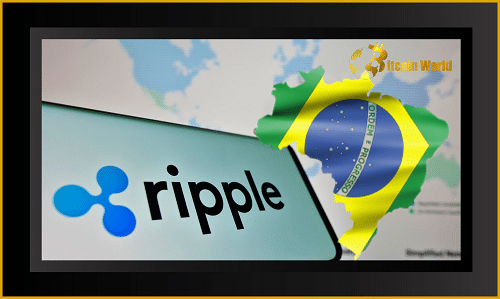Exciting news for crypto enthusiasts! Ripple’s XRP is making significant strides in Latin America, specifically in Brazil. Imagine sending money across borders quickly and affordably – that’s the vision becoming reality as Ripple’s innovative technology takes hold. Let’s dive into how RippleNet’s On-Demand Liquidity (ODL) is revolutionizing cross-border transactions in the land of samba and soccer.
Ripple and Travelex Team Up to Transform Brazilian Payments
Big things are happening in the Brazilian financial landscape! On August 18th, Ripple announced a game-changing partnership with foreign exchange giant Travelex. This collaboration will see Travelex leverage RippleNet’s ODL, using the XRP cryptocurrency to facilitate seamless and cost-effective cross-border payments for businesses operating between Brazil and other nations. What makes this even more significant? Travelex Bank holds the unique distinction of being the only bank in Brazil authorized by the Central Bank to conduct exclusive foreign currency exchange operations.
Why is This a Big Deal for Brazil and Ripple?
While other Latin American players like Banco Rendimento and Remessa Online have previously utilized RippleNet’s services, this marks a pivotal moment. Thanks to the green light from Brazil’s Central Bank, Travelex’s adoption of ODL represents the first instance of a Latin American bank directly using this powerful technology. This signifies growing acceptance and regulatory clarity for crypto solutions in the region.
Here’s a breakdown of the key benefits:
- Faster Transactions: ODL eliminates the need for pre-funded accounts, drastically speeding up payment processing.
- Lower Costs: By bypassing traditional correspondent banking, businesses can save significantly on transaction fees.
- Increased Efficiency: Automated processes reduce manual intervention and the risk of errors.
Mexico First: Setting the Stage for Wider Adoption
Initially, Travelex will focus on enabling these streamlined cross-border payments between Brazil and Mexico. This strategic move aims to unlock further payment opportunities within the region and cater to the specific needs of businesses engaged in this trade corridor. Think of it as a pilot program paving the way for broader applications and more corridors in the future.
Brazil’s Embrace of Crypto: A Supportive Ecosystem
This development aligns perfectly with Brazil’s proactive approach to the digital asset space. The enactment of the country’s first “Bitcoin law” in April 2022 demonstrates a commitment to establishing a clear legal framework for cryptocurrency regulation. This forward-thinking approach fosters innovation and encourages the adoption of digital asset solutions like Ripple’s ODL.
Brazil And CBDCs: A Glimpse into the Future of Finance
Beyond private cryptocurrencies, Brazil is also actively exploring the potential of a Central Bank Digital Currency (CBDC). While the concept has sparked debate, with economists like Fabio Araujo highlighting potential controls on citizens’ access to money, the initiative underscores Brazil’s ambition to be at the forefront of digital finance innovation.
Ripple CEO’s Perspective: A Perfect Match
Ripple CEO Brad Garlinghouse sees Brazil as an ideal environment for ODL adoption. He points to the country’s crypto-friendly regulatory landscape and the increasing interest from institutions in leveraging digital asset solutions. This confluence of factors creates a fertile ground for technologies like RippleNet to flourish.
The Immense Potential: Billions in Payments
Consider this: Brazil handles approximately $780 billion in payments annually. Garlinghouse emphasizes that Travelex’s utilization of ODL has the potential to dramatically enhance the efficiency of these cross-border transactions. This isn’t just about technological advancement; it’s about real-world impact on a massive scale.
What Does This Mean for Crypto Traders and the Market?
The integration of XRP into Brazil’s financial infrastructure through partnerships like this can have several implications for crypto traders and the broader market:
- Increased XRP Utility: Real-world use cases like cross-border payments can boost the demand and perceived value of XRP.
- Positive Market Sentiment: Adoption by established financial institutions can signal growing legitimacy and maturity for the cryptocurrency market.
- Potential Price Impact: While not guaranteed, increased utility and demand can positively influence XRP’s price over time.
- Wider Crypto Adoption: Success stories in countries like Brazil can encourage other nations and businesses to explore similar solutions.
Key Takeaways: Ripple’s Brazilian Breakthrough
- RippleNet’s ODL is now live in Brazil through a partnership with Travelex Bank.
- XRP will facilitate faster and cheaper cross-border payments for businesses.
- Brazil’s Central Bank’s approval highlights a supportive regulatory environment for crypto innovation.
- This is the first instance of a Latin American bank using ODL directly.
- The initial focus is on payments between Brazil and Mexico.
- Brazil’s ongoing exploration of CBDCs further emphasizes its commitment to digital finance.
Looking Ahead: The Future of Cross-Border Payments
Ripple’s expansion in Brazil is a testament to the transformative potential of blockchain technology in the financial sector. As more institutions embrace digital asset solutions, we can expect to see a continued evolution of cross-border payments, making international transactions more accessible and efficient for businesses and individuals alike. Keep an eye on Brazil – it’s becoming a hotbed for crypto innovation!
Disclaimer: The information provided is not trading advice, Bitcoinworld.co.in holds no liability for any investments made based on the information provided on this page. We strongly recommend independent research and/or consultation with a qualified professional before making any investment decisions.


